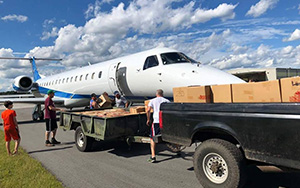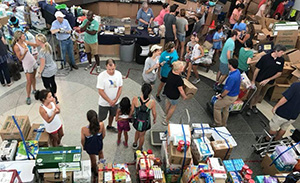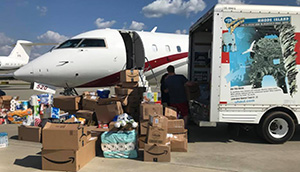
Sept. 26, 2018
Operation Airdrop last week wrapped up its mission of providing supplies to the communities most immediately impacted by Hurricane Florence, which blew through North Carolina and other parts of the Southeastern U.S. earlier this month.
More than 400 pilots volunteered with the organization during Hurricane Florence recovery efforts, delivering about 300,000 pounds of supplies – including food, diapers, medicine, water and generators – in the days after the storm hit.
 “It was truly astounding to see. Every type from CRJ700’s and E145’s and an offer for a 737 down to Zeniths and Helio Couriers were involved in our mission,” said Operation Airdrop board member Ryan Spellman. “Our ground operation also saw nearly 1.500 people working in various capacities at different times.”
“It was truly astounding to see. Every type from CRJ700’s and E145’s and an offer for a 737 down to Zeniths and Helio Couriers were involved in our mission,” said Operation Airdrop board member Ryan Spellman. “Our ground operation also saw nearly 1.500 people working in various capacities at different times.”
Operation Airdrop’s mission is to fly the first five to seven days immediately after a disaster occurs in order to keep the most critical to survival items available to cut off communities, while the larger entities get their operations set up to support the long-term recovery and survival, said Spellman.
“We take in supplies, in many cases by the tractor trailer load, once those supplies are downloaded, they are then sorted and added to 500 pound packets for later tasking to airplanes,” he added. “As we identify a community in need, we begin to work up intel on what those needs are, why and where we can safely land and from there begin to work out how many flights we need to make and how much supply is needed.
 “We do all of this based on the closest suitable airports, types available and all of the other critical planning and decision making that is needed to make these missions happen and do them with safety first in mind always,” Spellman said.
“We do all of this based on the closest suitable airports, types available and all of the other critical planning and decision making that is needed to make these missions happen and do them with safety first in mind always,” Spellman said.
Operation Airdrop, which was founded in the wake of Hurricane Harvey in 2017, focuses on taking care of immediate needs following a storm, though in some cases, such as with Puerto Rico following Hurricane Maria last year, it will continue volunteer efforts beyond the first week or so.
In North Carolina the need for help is decreasing, but there are still some communities that have major transportation infrastructure challenges and will for some time as some waterways are only just now cresting, Spellman noted. Food, water, bug spray, diapers, potable water, hygiene and medical products are always in demand.
“While it is tremendously hard to shut down an amazing showing of humanity, our mission is concluding as the demand signals show that our primary goals have been met,” said Spellman. “We are so tremendously grateful to the many companies and owners who did not bat an eye when the call went out to support this mission.”
Learn more about Operation Airdrop and volunteer opportunities.
